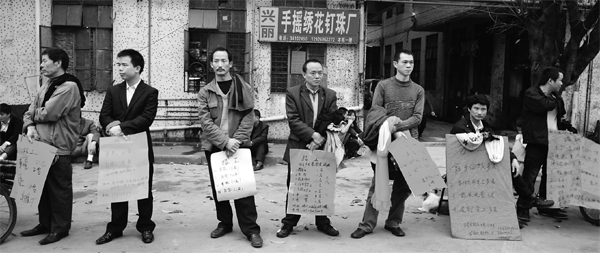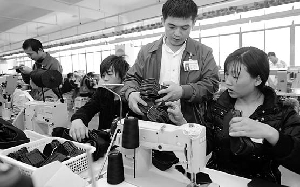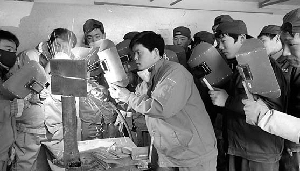|

|
|
Private factory owners use boards boasting attractive salaries and extra benefi ts to recruit workers at a job market in the suburbs of Guangzhou, capital of Guangdong province. The province is short 200,000 workers, say offi cials. ZHANG YOUQIONG/FOR CHINA DAILY
|
Bosses at Shanghai Yihsin Industry, a laptop manufacturer under Huan Hsin Holdings, said they plan to add 1,000 assembly line workers to its staff this month but are reluctant to raise salaries above the minimum wage of 980 yuan set by the municipal authority.
"Manufacturers have a very low profit margin. If we raise their pay we face a situation where we will have no profit at all," said human resource director Sun Yiduo. "Shanghai has the highest minimum wage on the Chinese mainland, so it is easier to hire here than elsewhere. Recruiting for our factories in Qingdao (Shandong province), where the minimum is 760 yuan a month, has been so much harder."
The labor shortage is the result of many factors, say analysts, but one of the biggest is the sudden rush in overseas and domestic orders being received by factories.
Dongguan recorded exports worth almost $5 billion in January, an increase of 34 percent over the same month last year, as trade continued to return to post-financial crisis levels, according to a spokesman for the foreign economic and trade department. However, by the end of last month, less than half of the three million migrant workers who left Guangdong and headed home for Spring Festival had returned, said Zhang Xiang, a publicity official with the provincial labor authority.
"Many companies restarted operations earlier than expected after the Lunar New Year as they secured more orders," said Zhang. "They had to cut employees during the global financial crisis, now they need even more to sustain growth." Firms began hiring temporary workers during the second half of last year when business started to bounce back, but now they need a long-term employment strategy, he said.
The success of the nation's 4-trillion-yuan stimulus package in creating more job opportunities outside of the nation's industrial and economic centers has also contributed to the shortage, argue experts.
A poll of migrant laborers by the Ministry of Human Resources and Social Security this year found that 62 percent planned to return to the jobs in Pearl River and Yangtze River deltas after the Lunar New Year festivities, reported Xinhua News Agency. However, 30 percent could not guarantee they would go back.
Because of the high costs of living in the big cities, most workers are prepared to accept lower salaries for jobs closer to their families.
 |
|
Migrant workers work the machines at a busy shoe factory in Jinjiang, Fujian province. Only 90 percent of the factory’s workforce returned after the Spring Festival holidays. ZHANG GUOJUN/XINHUA
|
 |
|
A teacher demonstrates electric welding at Taihe Vocational Training Center in Jinzhou,Liaoning province, where short-term training courses are being held for laid-off workers. LI TIECHENG/XINHUA
|
Xiao Zhiheng, vice-governor of Guangdong, said many farmers in the western, northern and eastern parts of the province have chosen to work for companies that have opened bases close to their hometowns as part of an industrial transfer plan introduced in 2008.
The rapid development of other regions, such as the Beibu Bay, off the coasts of the Guangxi Zhuang autonomous region and Hainan Island, and Bohai Bay in Liaoning province, has also helped divert laborers, said Zhang Yi, a researcher with the population and economic research institute of the Chinese Academy of Social Science.
"Massive construction projects in inner regions, which are traditional sources of labor, are now attracting laborers themselves. So it is no surprise companies in the Pearl River Delta have found it hard to find staff," he said.
Authorities in Shanghai and Guangdong have both adopted measures to help migrant workers and factories, including providing professional skills training, and officials said they are confident laborers will start to flood back into the deltas. However, experts are not so confident and suggest that the lay-offs and pay cuts rolled out at the height of the financial crisis last year may put some people off from venturing away from home.
"Both governments and companies need to change their attitude towards the migrant workforce," said Zhang Yi. "They need respect, and need stable and guaranteed lives. If the enterprises expect to always have laborers at their disposal, this kind of shortage will always be a headache."
Xu Guangjian, vice-president of the school of public management at Renmin University of China, added: "Although the supply of migrant workers is still abundant nationwide, an aging population coupled with a reduction in new labor in the long term means the bonus of China's large population - cheap labor - will not be an inexhaustible resource forever."
To ease their reliance on cheap labor, enterprises in the deltas are being urged to improve their use of technology.
"Sooner or later, labor is no longer going to be cheap in China and manufacturing companies will start to move elsewhere, just like what happened in Japan and South Korea," said business leader Liu Yonghao. "Companies have to upgrade their technologies and produce goods with more added value. Governments also must work with companies to solve migrant workers' problems with housing, medical insurance and education. This will help them to feel safer when working in cities."
Hangzhou textile boss Cao said he is already planning to buy new machinery to help improve efficiency and reduce the reliance on workers.
"If it helps to push forward industrial upgrading, the labor shortage may be a good thing for companies, too," added Dongguan Party chief Liu Zhigeng.
(China Daily 03/11/2010 page1)
More Cover Stories